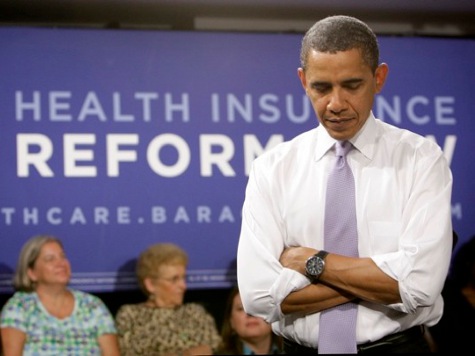
Conservatives should be ecstatic that Supreme Court Chief Justice John Roberts sided with the four liberal Justices ruling the Affordable Care Act (Obamacare) is constitutional as a tax, while siding with the four conservative Justices that the law is unconstitutional under the Commerce Clause.
Roberts just humiliated President Obama as a dishonest and contemptible politician, gutted the social welfare and regulatory state, and appears to have set up the entire Obamacare law to be constitutionally invalidated.
Senator Barack Obama cemented his relationship with John Roberts by leading the opposition by liberal Senators to Roberts’ confirmation as Chief Justice of the Supreme Court. Obama said he did not trust Roberts’ political philosophy on Constitutional questions such as: “whether the Commerce Clause empowers Congress to speak on those issues of broad national concern that may be only tangentially related to what is easily defined as interstate commerce.”
Obama, as a constitutional lawyer, knew Congress’s power to exercise control over individuals’ personal lives began through Supreme Court decisions during the President Franklin Roosevelt’s Administration that expanded the Constitution’s Commerce Clause far beyond its limited plain reading: “The Congress shall have Power”…”To regulate Commerce with foreign Nations, and among the several States, and with the Indian Tribes.”
President Obama may have stridently denied Obamacare was a tax, but the legislation contains 21 new taxes that raise $800 billion over the next ten years. On the same day as the Obamacare decision, the Court also ruled 6-3 that a law convicting a California politician named Xavier Alvarez for falsely claiming he won the Medal of Honor was unconstitutional.
Justice Kennedy wrote for the majority: “Though few might find (Alvarez’s) statements anything but contemptible, his right to make those statements is protected by the Constitution’s guarantee of freedom of speech and expression.”
Having ruled dishonest boasting by politicians cannot be a crime, Roberts reasoned Obama’s dishonesty does not invalidate Obamacare: “decisions are entrusted to our nation’s elected leaders, who can be thrown out of office if the people disagree with them, it is not our job to protect the people from the consequences of their political choices.”
Before 1937, Congressional efforts to pass legislation forcing unionization, minimum-wage laws, restrictions on agricultural planting and so forth were held unconstitutional by the Supreme Court as “not commerce.” After winning re-election in 1936, Franklin Roosevelt proposed the Judicial Procedures Reform Bill that would have given him the right to “pack” the Supreme Court in his favor by appointing six more Justices.
However, in what became known as “the switch in time that saved nine,” Justice Owen Roberts capitulated to Roosevelt’s threat to rig the Court by reversing his position and voting to expand the Commerce Clause to uphold minimum wage laws as regulating “commerce.” Four years later, an intimidated Court dispensed with the 10th Amendment to the Constitution: “The powers not delegated to the United States by the Constitution, nor prohibited by it to the States, are reserved to the States respectively, or to the people,” as but a “truism” and not a limitation on Congressional power.
Thomas Jefferson warned the natural tendency is for government to grow like a poisonous vine; it sprouts through any gap. Giving Congress the power to freely regulate nearly everything means they can choose which restraints to place on the self-interest of one regulated party in order to provide advantages to another. Not only does this expansion of the Commerce Clause lead to the continual rise of the social welfare and regulatory state; it is the secret sauce that funds political crony capitalism.
The Roberts Opinion that Obamacare is “not commerce” guts seventy-five years of the poisonous growth of the vines of government under the expanded Commerce Clause:
The Framers knew the difference between doing something and doing nothing. They gave Congress the power to regulate commerce, not to compel it. Ignoring that distinction would undermine the principle that the Federal Government is a government of limited and enumerated powers. The individual mandate thus cannot be sustained under Congress’s power to “regulate Commerce.”
In what may be Roberts’ ultimate legal slam-dunk of Obama, his ruling that the President and Congress passed a tax now threatens to constitutionally invalidate all of Obamacare under Article 1, Section 7 of the Constitution: “All bills for raising Revenue shall originate in the House of Representatives; but the Senate may propose or concur with Amendments as on other Bills.”
Although the law originated and was narrowly passed in the House and then the Senate wrote and passed its own version of law, the House version hit a roadblock in the Senate. So Democrats, to avoid an even riskier vote in the House and because they reasoned the legislation wasn’t a tax bill, pulled the Senate version of Obamacare and deemed it passed. Failing to originate the final bill in the House allows another constitutional challenge that the law is invalid.
Conservatives should praise John Roberts as a brilliant legal tactician who has revived the Original Intent of the Constitution’s Commerce Clause and vanquished Barack Obama’s quest for the forward expansion of a Living Constitution. At the still young age of 57, Chief Justice Roberts may have two more decades to honor the strict construction meaning of the Constitution of the United States.

COMMENTS
Please let us know if you're having issues with commenting.